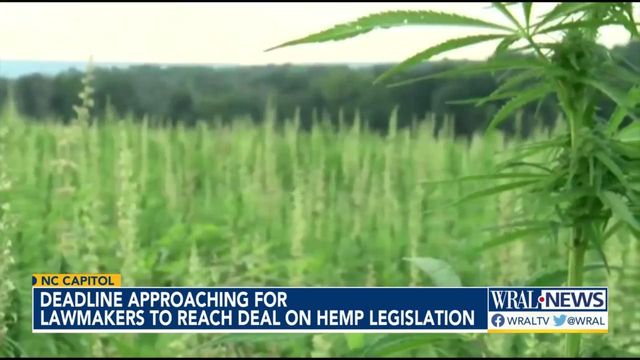Hemp legalization, elevator safety, alcohol bills and more head to Cooper for signature
The North Carolina Senate on Wednesday sent a bill to Democratic Gov. Roy Cooper to keep hemp farmers and sellers in business.
The measure passed little more than 24 hours ahead of a looming deadline that threatened to render the burgeoning industry illegal in the state starting Friday.
It was among a handful of bills that advanced the the governor's desk on Wednesday as the short session neared adjournment. Lawmakers have hoped to end the session before the July 4 weekend.
The 41-2 vote on hemp ends a high-stakes political drama between the Republican-controlled House and Senate.
The House on Tuesday passed a more sweeping agricultural bill, Senate Bill 762, after a committee voted to strip hemp legalization from the farm bill. House lawmakers had instead pushed for Senate Bill 455, a more narrowly tailored hemp legalization bill. After the House stripped hemp legalization from the Senate’s proposal, the Senate refused to consider the House’s more tightly focused legislation In the end, the Senate sent both measures to Cooper on Wednesday.
“It was a little bit of a standoff,” Republican Senate leader Phil Berger told reporters after the vote.
State lawmakers temporarily legalized the agricultural crop in 2015 through a pilot program, which is set to expire late Thursday. Had lawmakers not voted to legalize hemp, the burgeoning industry would have been likened to marijuana as an illegal controlled substance under state law, making sellers subject to charges for possession and trafficking.
"It has recreational benefits if you just want to have a great night, you can also have a really relaxed night, a fun energetic night but also if you have anything from neuropathy, we've seen people with Alzheimer's and stuff like that, and it's really helped with cannabis," said Austin Bain, the chief operating officer for Hempies, which sells hemp products.
Senate Bill 455 would distinguish hemp from marijuana and conform to federal law by defining hemp as cannabis having less than 0.3% of Delta-9, the chemical in marijuana that produces the drug's high.
“They ran the clock out on the Farm Act in the House yesterday and there’s just not enough time to not concur and send it back to the House,” said state Sen. Brent Jackson, a Sampson County Republican who was deeply involved in negotiations. “I made the decision yesterday evening we would take the high road and we’d pass their bill to get it onto the governor so he could sign it.”
Cooper is expected to sign the bill ahead of the Thursday night deadline to keep hemp legal, though his office didn’t immediately respond to a request for comment on the governor’s attitudes towards both measures.
In recent years, discussion of permanently legalizing hemp has drawn protests from law enforcement groups, who said it would make it impossible to arrest people for possession of marijuana. But this year, there has been little opposition to the bill.
Bain said 90 percent of his customers come in specifically for hemp products.
"[If the bill hadn't passed,] it would've put us in some kind of limbo ... because on a state level, we're not exactly protected, technically, we would've been kind of illegal," he said.
A number of other measures made their way to Cooper on Wednesday or advanced in the legislative process. Among them:
- A proposal that would fill a gap in coverage for domestic violence protective orders was sent to Cooper’s desk. The bill, House Bill 615, which would let judges temporarily renew a domestic violence protective order to fill the gap in time between an order’s expiration and a forthcoming court hearing.
- A plan to make elevators in rental houses safer was also sent to Cooper. The measure is named Weston's Law, after a young boy who was crushed between the inner and outer elevator doors last year while vacationing at a beach house in Corolla. The bill requires rental homeowners who have a large gap between the floor and the elevator to cover it with a barrier. It passed both chambers unanimously.
- A bill changing an alcohol law that requires bars that don't serve food to be classified as private clubs. Under current law, they're supposed to charge membership and keep records of their members. The bill, also headed to Cooper for signature, would remove that requirement.
- A measure temporarily suspending the state’s automatic erasing of certain criminal records. If House Bill 607 was signed into law, an estimated 10,000 North Carolinians wouldn’t have their records automatically expunged, though there would still be a process in place for them to seek the permanent deletion of files.
- The Senate unanimously voted to confirm Kody Kinsley, Cooper’s top public health official, as the permanent head of the state Department of Health and Human Services. Kinsley is the first openly gay Cabinet member in state government history. The Senate also confirmed Eddie Buffaloe for secretary of the Department of Public Safety secretary.
Medicaid stalled
One plan not yet going to Cooper is Medicaid expansion, which was also left out of lawmakers’ recent budget proposal. Cooper hasn’t weighed in on the state spending plan, and Berger said he’s unsure whether Cooper would veto it.
Berger also said his chamber won’t consider a House proposal that would study the issue further with a pledge to vote on Medicaid later this year.
“We will not take that up,” Berger said. “I don’t know that there’s a pathway for us to reach an agreement.”
WRAL reporter Leslie Moreno contributed to this story.













